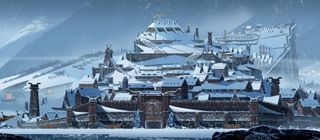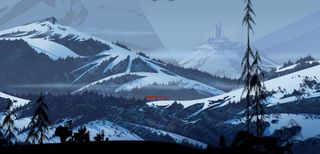Why I Love: Journeying in The Banner Saga

In Why I Love, PC Gamer writers pick an aspect of PC gaming that they love and write about why it's brilliant. Today, Tom goes on a sad road trip in The Banner Saga.
Years ago, in a less blobby physical state, I walked forty miles in a day across some mild English countryside*—an ordeal that redefined my notion of distance and destroyed my ability to enjoy travelling in video games. Movement in game worlds is fundamentally stupid, and I just can't let it go. I get stuck on trees, I spend ages incrementally humping my way up slopes the game doesn't want me to climb, I hop harmlessly down sheer cliff faces that should break bones. I scoff at "overencumbered!" warnings and sigh at stamina bars. These throwaway nods to realism cause momentary irritation when the effect should be something resembling a slow wearying of the soul.
Fast-travel is even worse. The screen fades to black and your avatar reappears hundreds of miles away in the same clean clothes, untouched by the road. I'm tickled by the idea that—even in war-torn fantasy worlds—nothing happens to you during those long hard walks. Nobody argues or jokes or hunts or fends off bears. Your party marches in a fugue state. What happens on the road stays on the road.
Not so in the Banner Saga. Between fights and story events you watch your caravan of fighters and families march through exquisitely drawn arctic landscapes. In these journeying phases you step away from the individuals you roleplay in conversation and combat sections to play as the entire caravan, which functionally behaves like a long straggly body. It has wants and needs and can be wounded and killed. It can grow tired and unwieldy and slow. There's a morale icon at the top of the screen which gets sad when your people face death and dwindling supplies, but that's just a UI flourish that represents another bodily need. The collective weight of these needs grows as you travel between towns and godstones.

The mechanisms for this are clearly exposed in an information panel listing your group's numbers and supply stores at the top of the screen. With these simple stats The Banner Saga creates a better sense of arduous trekking than most big-budget open worlds. They translate decisions made during conversations and story events into cold numeric consequence and collectively, over time, create a worsening fatigue. That's perfect. My clan is crossing wild mountains with limited food. I want to feel that struggle.
It works because those numbers are so responsive. When I invite a group of disenfranchised fighters into my caravan and they steal my stuff and run, the supplies number holds me to account. When I lose my best fighters to injury for a few days and have to sacrifice warriors taking a more defensive posture in my next battle, that diminished tally of fighters reminds me of my mistakes. Errors on the battlefield tumble down through each resource system and become quantified and then magnified with each step. An injured warmaster becomes fifty lost men, and the camp's spirits falter. It's a steady emotional battle of attrition—an effective substitute for the physical exhaustion the game can't create.
I've seen players ask for the option to speed up or skip these sections, which would be a loss. Those quiet phases of non-interaction force me to reflect. They give my brain space to contextualise those stats and read drama into their changing values. They give me time to absorb the scale of the gorgeous landscapes. You can zoom out so far that your caravan becomes almost insignificant—a trickle of ants marching through mountains of sugar. Pull out further and only the banner is visible. This too grows over time as your caravan's scribes add extra cloth and new verses to the saga of your people, who literally carry the weight of your actions through the world. The effect is beautiful, lonely and slightly sad, like the quiet old dales of the English north west—minus the snow and death and rampaging killer dredge Dredge hordes.
*This killed me. I am dead now.
The biggest gaming news, reviews and hardware deals
Keep up to date with the most important stories and the best deals, as picked by the PC Gamer team.
Part of the UK team, Tom was with PC Gamer at the very beginning of the website's launch—first as a news writer, and then as online editor until his departure in 2020. His specialties are strategy games, action RPGs, hack ‘n slash games, digital card games… basically anything that he can fit on a hard drive. His final boss form is Deckard Cain.
Most Popular





